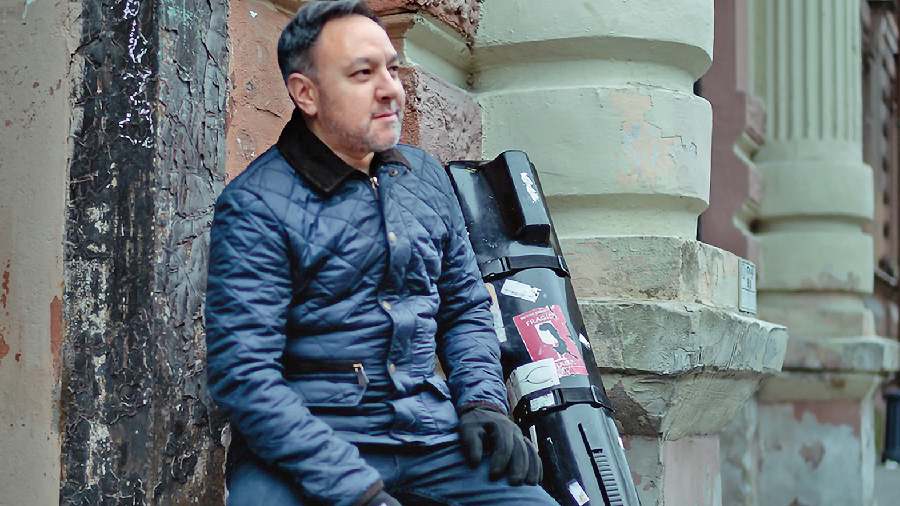He loves his rice and every time he visits Kolkata, fond memories are what he travels back with. Sitarist and composer Jonathan Mayer who recently performed at Kala Mandir on January 14 with Anup Biswas, playing concerto for cello and sitar by Andrew Campling and on January 18 at Sujata Sadan at a solo concert with other artists. His ties with Kolkata go much deeper. Jonathan’s dad, the noted composer John Mayer, was born in the City of Joy and spent a lot of time here. Jonathan is the director of First Hand Records Ltd based in the UK and has performed with many orchestras around the world and has given written works for London Philharmonic Orchestra. A Telegraph chat.
What are your earliest memories of Kolkata?
I remember 1986, standing on a balcony at a family friend’s house in Chowringhee watching the trams rattle past with goats on the road. Fantastic! Also visiting my father’s old home on Gumghar Lane was an early memory of Kolkata for me.
What are your favourite things to do when you are here?
Kolkata is the home of music. It has a rich tradition of Indian classical music as well as Baul, Tagore, jazz, western classical, plus much more! So nothing is better than attending concerts, meeting and playing with fellow musicians while in Kolkata.
Do you speak Bangla?
Unfortunately, I do not speak Bangla but neither did my father. My grandfather was an Anglo-Indian dock worker at Howrah who spoke Bangla but my grandmother was Tamil, so they mainly spoke English at home. I was born in London and decided I wanted to concentrate on the most important language to me — music. But, I am trying to pick up phrases every time I come over.
What about Kolkata did you hear from your father, John Mayer?
My father spoke of playing at the Lighthouse Cinema during the 1940s. He was a great violinist and was asked to entertain the guests there but he also spoke of the riots during 1946 where he was helped by the rickshawallahs to avoid the violence as a young man. He also spoke of the Kolkata School of Music and his experience of playing and studying with the visiting musicians during the Second World War. Because of the serving armed forces travelling through Kolkata at that time, many great musicians frequented it. He always spoke fondly of Kolkata and returned often, as do I.
When did the sitar fascinate you?
I started studying violin, piano and composition at a very early age but as I entered my teenage years I discovered my father’s old LPs and cassettes featuring Indian instruments. My father pioneered the fusion of Indian and western music as far back as the mid-1950s.
So, when we had family friends visiting from Kolkata in 1990 I asked them to pick me up a sitar. My journey started there and my first sitar was from Naskar (Naskar & Co., manufacturer of Indian musical instruments, in Bhowanipore), I still have it.
What do you think is the language of Indian classical music?
Music is a language and I feel each genre has its own dialect but all derive from the same source. The phrasing of Indian classical music is very different from western music as is the approach to the rhythm but fundamentally they come from the same place — naad.
Do you play anything else just as a hobby?
I still like to play the piano and always compose next to it. I also like to play PS4 with my boys when I get a chance!
What are your other favourite musical instruments?
This varies from day to day. I have been listening to a lot of Ustad Sultan Khan recently as the lyrical qualities of the sarangi are sublime, but I have also been listening to organ music. I love Bach but have also been listening to earlier composers of the church organ like Nicolaus Bruhns. The differences and similarities between Indian classical music and Baroque music are fascinating to me.
We must talk about your favourite Bengali food...
Rice rice rice rice rice. I cook a lot of rice at home.
What do you usually carry back from Kolkata? Will it be the same this time?
To be honest, I have to bring back spares and parts for my sitar but also kurtas, spices and memories. My father came from Kolkata, I play the sitar and so have a deep connection to this wonderful city, so as always the best things I bring back to the UK are love and memories.
